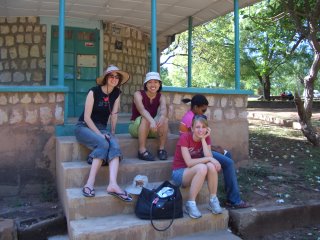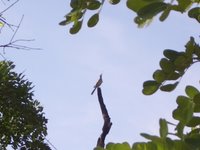 30 May 2006
30 May 2006Lovely! Online after almost a week of not picking up a signal. We are in the midst of a communications feast—my parents have hooked up Skype and are calling everyone they can think of—to make the most of the connection while it is with us.
Tonight, slightly feverish as a result (probably) of yesterday and today’s obligatory pilgrimage to Yankari Game Park for a family vacation before we all head off in separate directions: me off to Kano on Saturday, my sister Laura and Uncle Phil and cousin Amiee off to the U.S. on Sunday, and my parents and Tass off to Lagos for a student visa interview at the U.S. Embassy and then off to the U.S. I am looking forward to getting to Kano. It has been good to be home, but I feel that sated feeling that you get when you eat or sleep too much. It’s time to move on.
We’ve had a full house. My Uncle Phil was able to find frequent flier tickets for my seventeen year old cousin Amiee (who was missing all her friends from last year when they were here on a Fulbright) and himself to be back for a week and a half around Hillcrest graduation time. In the past week, we have hosted 3 major parties: a dinner party/potluck for around 25 on the Sunday that I got into Jos, then the graduation breakfast for all the recent graduates (who had just, as per tradition, spent the entire night up celebrating) on Saturday morning, and on the most recent Sunday, a thanksgiving celebration for my dad’s promotion to full professorship, which is just one of these things that must be done—the celebration, that is, not the promotion. Over 200 people (from the university community and other communities my dad is involved with) showed up to that, and Laura, Tass, Amiee, and I stayed busy rushing around serving soft drinks and plates of food to everyone, like good Nigerian daughters. Needless to say, although all events were quite fun to host, we were all quite ready for a break from the house and from Jos. Yankari is only three hours away in Bauchi state, so it is a do-able quick vacation.
My friend Hillary, who just recently finished the PhD part of her MD/PhD degree at UW-Madison, is currently here in Jos, along with her husband, Ryan, doing a research/volunteer rotation with with Dr. Chris Isichei at Faith Alive Hospital. I was excited that Hillary was able to join us on the trip to Yankari, although Ryan had a deadline for the design and video projects he is working on, and she had to come by herself. (Hillary, Amiee, Tassneem, and I are shown here on the stairs of one of the guest cabins.) It was probably about the “dry-est” “safari” we have ever been on. We were all so exhausted that we just sort of sat in the back of the lorry and didn’t look too hard for animals—and thus did not see many, not even elephants, which I was sorry about for Hillary’s sake, since this was her first time at Yankari. The warm springs, as usual, made up for disappointments in the animal-spotting department, very refreshing after the long, hot, bumpy ride. The electricity went out about 11:30pm, meaning the air conditioning also went off, so the rest of the night was the sort of night where you keep waking up and thinking that you can’t stand one more minute of lying on something as hot as a mattress. Uncle Phil had seen a scorpion at his house earlier, so I was also worrying about things that could come scurrying up on the extra (and rather scary looking torn open) mattresses on the floor that Hillary and I were sleeping on. (There are very nice beds in the cabin but because we didn’t want to get an extra cabin, we had requested some extra mattresses for the floor.) Also praying: dear Lord, please do not let there be bedbugs. I do not want to invite Hillary along on our trip to give her bedbugs.
At 5am, I reached for my phone, which gave off enough light to find my flashlight, and stumbled through the room where Laura, Tass, and Amiee were sharing a bed, (waking them up in the process by dropping my flashlight and creaking the door), into the bathroom, where I tossed a bucket of water over myself, which helped me go back to sleep for about an hour. By 6:30am, however, I was back up and dressed for the early morning safari, which was much more enjoyable than the afternoon one, although we still saw only water buck and lots of birds. I was glad that the guide let us walk back to the Marshall Caves (named after a European archeologist for some reason… I would have thought that this trend would have stopped after the colonial era) which are round shallow man-made caves that honeycomb a granite cliff face. They were “discovered” in the 1980s by a park ranger—I’ve always assumed he was Nigerian—but maybe he was the expatriate “Marshall” of the name. We followed a slightly different path this time, and I saw for the first time the signpost that speculated that the caves, although thousands of years old, had possibly been later used as refuge for people fleeing from slave traders.
One of the loveliest moments this morning was observing a grey hornbill posed picturesquely (and she KNEW it) on a dead tree trunk, silhouetted against the sky. She threw her head back melodramatically and performed a few stanzas for us. She kept tossing her head around like a prima donna, and the notes she sang could have opened an opera.

My family has probably been to Yankari about twenty times. This is the most likely place in Nigeria (I believe) to run into random expatriate tourists (often haggard looking Germans who are caravanning across Africa), as well as secondary school students or university students on field trips. The lineup this time was two groups of secondary school students, one set from Katsina and one set from further north in Bauchi, and a group of eight men motorcycling from Gibraltar to Capetown. Most of them were from the UK, with one from France and one from Argentina. An interesting group of “regular Joes” as the one talking to Dad described himself, who didn’t particularly look like the stereotypical motorcycle “gang”. My friend Rachelle and I did run into a group of Hells Angels once in the Blyde River Canyon in South Africa. They fit the stereotypical motorcycle gang-look, long beards, tattoos, etc., but to our disappointment, we saw them load-up into a caravan-bus—no motorcycles in sight. These fellows at Yankari, on the other hand, had powerful looking motorcycles parked along side their uniform spic-and-span black and grey tents. They also had a jeep and another caravan-van along. The sort of thing you might see in a reality television show.
Tourists are fascinating to me—perhaps because I’m often afraid of being taken for one. That’s why I prefer to visit friends or families when traveling—to be more of an “insider.” But, again, that’s one of those pretentious self-contradictory things, because one is inevitably a “tourist” when sight-seeing in unfamiliar places. And, really, it’s not such a bad thing, as long as one isn’t obnoxious about it. I say this knowing that if I travel all the places I want to travel: India, Spain, Italy, China, Brazil, Jamaica, Israel, Lebonon, Ireland, Wales, Kenya, Mozambique, Senegal, Morocco etc. etc. then I will, despite my studied avoidance of large hotels and tour guides, be a tourist over and over again. But, of course, there are ways of traveling (such as trying to travel to places you have a personal contact) that can, perhaps, lessen the gawkiness of it. (And let me take this moment to point out what rubbish the “Lonely Planet Guide” to Nigeria is. I had a peek at it when my German classmate last year in Sokoto brought it out to try to identify what to see in Sokoto. We were all amused to see that they mixed up cities and claimed that Sokoto (founded in around 1804 [and I’m sure I’m going to discover that I’ve posted the wrong date, while making fun of someone else’s mistake—my mistake, however, will only be off by a couple of years] by the jihadist Usman dan Fodiyo) was some 500 years old. According to them, (wai) Nigeria is also in a constant state of civil war…. )
Also, although I love photography, I take fewer and fewer photos these days. I prefer to take photos of people and places I have grown to know—portraits of friends rather than the beautiful or striking shot for the sake of a beautiful or striking shot—the tourist or photojournalist photograph is impersonal and often crosses the border of interest into disrespect. Yet, despite this anxiety about disrespect, I (again) recognize the contradictions within me---that fever to photograph still comes across me—that slightly crazed feeling that you are living the moment not for the sake of being in the place but for the sake of capturing certain images, a crossbar of late afternoon light, an old woman framed against a garish street carnival billboard in Oxford, a sinister shadow under draped plastic in Washington D.C., and closer to home, the silver line of a net thrown out against the sunrise to the ocean in Ghana, the turbaned advisors to an emir at a durbar I attended in Gombe. A certain fever comes over me at times if I have the camera in hand. I discipline myself by trying to take it out (the SLR, at least) only after I have been in a place for a while, only after I have grown intimate with spaces and people, so that they are entwined with certain emotions and not just the “picturesque.”
When I visited my friend Rachelle in South Africa in 2002, I grew so troubled by my own desire to “capture” the “picturesque” and my observations of a bus load of French tourists taking photos of the “locals” that I started taking photos of the tourists—in all their t-shirted and shorted, potbellied and sunburned glory. Tourists watching cultural dancers. Tourists buying pots on the side of the road. Fannypacks bulging out from lumpy khakhi shorts. So, I thought it was appropriate today that some of the secondary school students from Katsina asked to pose with us for a photo and then took photos of the lorry full of tourists, which included my family—although we have probably been to Yankari over twenty times. The spectator becomes spectacle. Poetic justice for my soul, even if it means that I am seen as one of the tourists.
Last year, the week before I left Sokoto, I went around with my camera—to the video club where I first found the tear-jerking (Indian film) Kal ho Naa Ho (--currently one of my favourites--which I bought three copies of trying to find one that didn’t cut off the ending) and first fell in love with Hausa films, to my church friend Dinah’s house, to my tutor’s house, to the shop kept by the Igbo surgeon’s wife where I would sit and chat in English on my way back from the video club, and when the ladies who sat outside under the neem trees beside the compound where I lived saw me with my camera, they asked me to take their photos.
I got the addresses of everyone whose photo I took and sent all the doubles back to Sokoto. That felt like a turning point. Like the transition from one language to another.
No comments:
Post a Comment